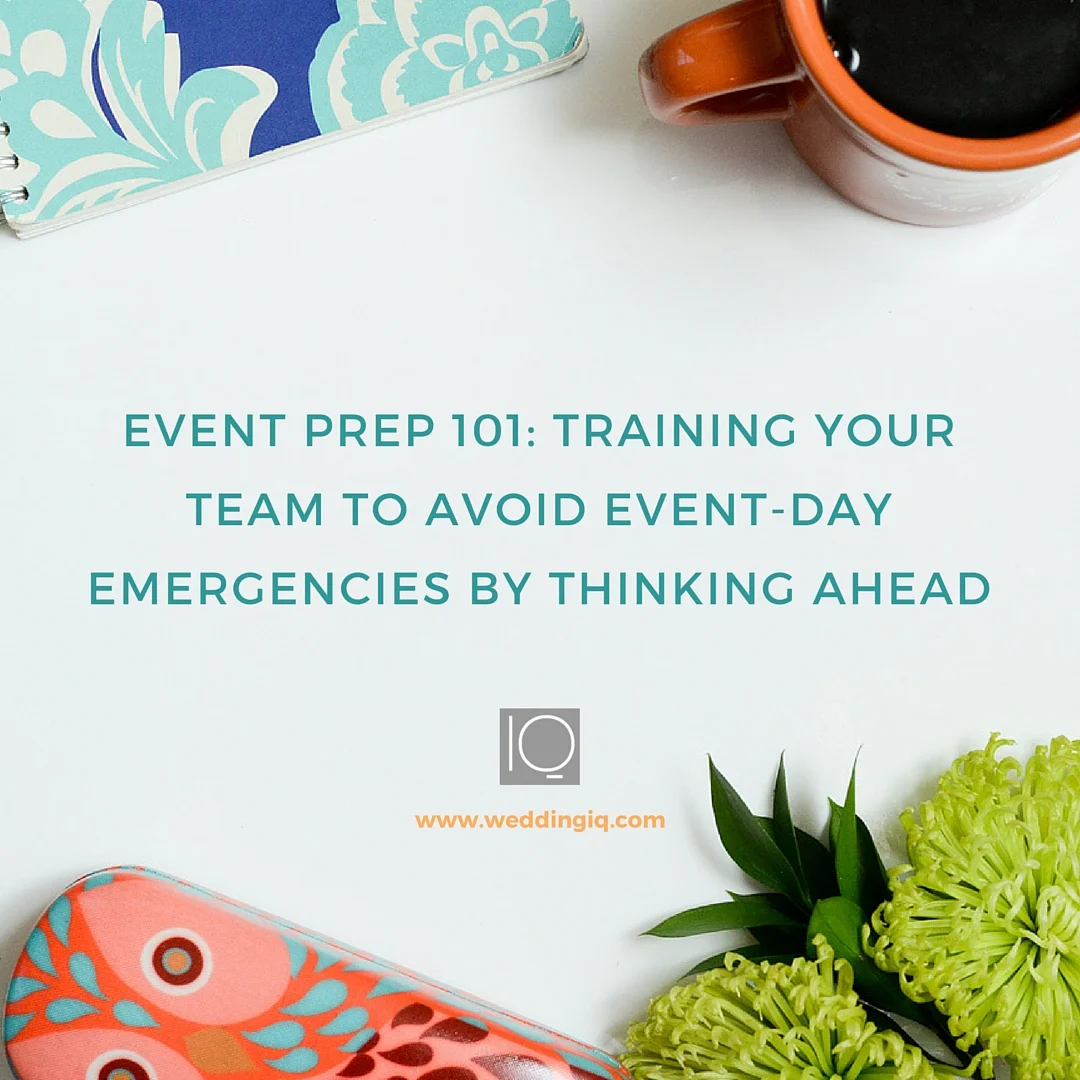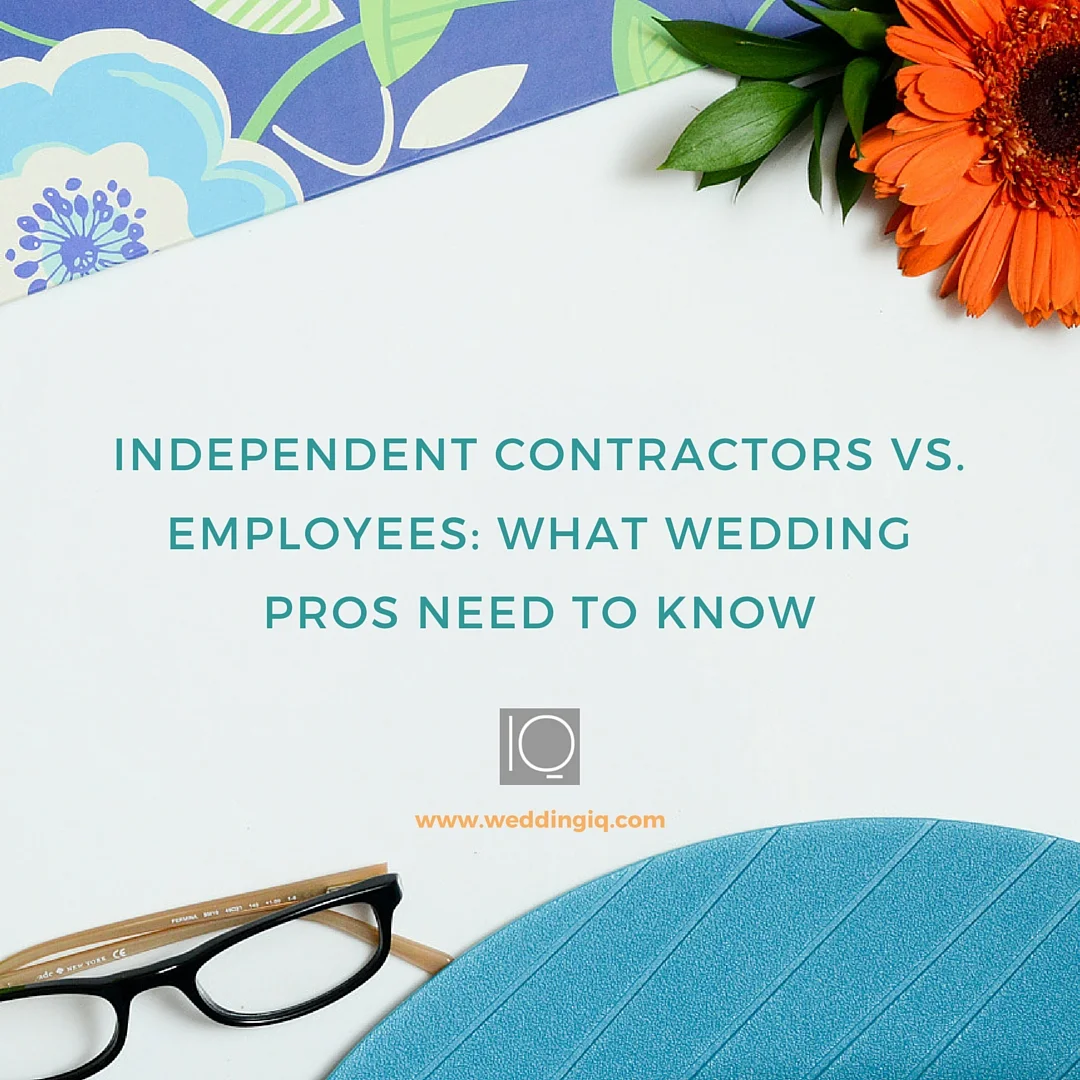How Job Descriptions Will Transform Your Wedding Team (Even If It Doesn't Exist Yet)
When it comes to operating our business, we're all guilty of "making it up as we go along" - as a matter of fact, as creative entrepreneurs, this is where we excel.
We're the thinkers and dreamers, always striving to discover the "next big thing." We're also generally an idealistic bunch, as it takes a lot of optimism to risk starting your own business. It’s exciting to design a logo or choose colors for your fledgling company, and to brainstorm all the ways you can help clients create the event of their dreams. You may imagine sitting in your office or working on site, basking in the pride of having finished a job and the kudos that may pour in. These dreams are what propel us forward and motivate us to do this work every day, even when we don't know exactly what we're doing.
Pretty quickly, however, we become immersed in the very real, practical aspects of owning a business. There are never-ending items to be accomplished, deadlines loom ever closer, and don’t forget the "big picture thinking" necessary to help a company grow and prosper. You cannot enjoy the rewarding and fun parts of your job when you are drowning in the mundane. (This is part of what Jennifer was referring to in Monday's post about systematizing your wedding business, and in her mention of the Michael Gerber classic, The E-Myth.)
In addition to creating systems and workflows for your business, another project that will help you transform your wedding business into a more productive, profitable venture is creating job descriptions, both for yourself and for your team. Whether you are a solo entrepreneur or have a trusted cadre already in place, you should have a firm understanding of each person's responsibilities so that you can easily scale your business as demand for your service or product soars.
There are multiple factors to consider as you create your job descriptions - I'll break them down for both single-operator businesses and larger-scale entities.
The One-Man (or Woman) Band: Job Descriptions for Solopreneurs
When you're just starting out, it may be hard to envision what your business will look like in the coming years. You may be overwhelmed with excitement just to be taking on a few clients, and satisfied doing most (or all) of the work yourself. This actually benefits you in the long run, because being hands-on in the day-to-day operations of your new venture helps you to discover exactly what it takes to run a wedding business.
On the other hand, as your business' popularity grows and your professional reputation is established, you may find you're unable to keep up with all the daily tasks yourself. Things will probably start to slip through the cracks. You realize that you now need help - whether it's someone (or multiple someones) to help you with events, or someone to work in the office while you're out. Whatever kind of team you need, hiring someone to assist you in any capacity requires an understanding of exactly what you need them to do.
All too often, my industry friends have brought on new employees or contractors, only to quickly become discouraged by the amount of instruction involved in training their new hire. Or, they become frustrated because the person who was supposed to be a lifesaver didn't perform all the tasks that should have been completed. In most cases, it was a lack of preparation on the part of the employer that led to the problem, and a little advance planning could have saved a lot of headaches later.
Acclimating a new team member requires a time investment, without a doubt - but creating a job description for your new hire before actually hiring them will ensure the process is smoother for both of you.
Questions to Ask Yourself:
- What tasks are overwhelming to me right now?
- What tasks do I enjoy or consider my strengths?
- What tasks do I absolutely dislike or do not complete with efficiency?
- Do these tasks fall under certain categories such as administrative, marketing or event-related technical skills?
- Do I need a full time or part time employee, or an independent contractor? (If you're unsure of the difference, check out this previous post from attorney Annette Stepanian!)
- What does a typical working day look like for this person?
- Will they work on-site at events, at home or in my place of business?
- Will they work with me or independently?
- What skills or equipment must they possess to do the job?
- What skills am I willing to teach on the job?
- What equipment do I have available to them and do they need training on how to use it?
- What type of personality would best fit this type of working environment?
Answering these questions before you begin your hiring search will give you a better idea of the type of person who will be a match for your business' needs, and will allow you both to have a complete understanding of what the job requires. Remember that, as the business owner, it's your responsibility to thoroughly explain these requirements to the best of your ability so that you're setting up your new team member for success.
(Something else to consider: even if you have no immediate plans to hire help, simply identifying the areas of your business that you'd most like to delegate can keep you focused on your future success. Knowing that someday you won't have to do it all can be a great motivator!)
We've Got Team Spirit: Defining Job Descriptions for the Help You've Already Hired
Of course, not everyone in the wedding industry is a solo entrepreneur. Perhaps when you started your business, you hit the ground running with a team already in place, either because your service category requires it or you just always envisioned this approach. The question is, do your employees or contractors always know what is required of them, and are you utilizing their talents and skills to maximum capacity?
You may think your team members already know their job description, but if it isn't clearly defined, I can almost guarantee they could use a refresher. You may also have been working together for so long that you don't even know what your team does, you just know the system works.
If you don't think you need job descriptions in your business, consider this: what would happen if one of your team members suddenly left, and you had to immediately find a replacement? Sure, a departing employee or contractor may stay on long enough to help train a new hire, but just as often, that task falls to you - and if you have no documented job description in place, you may not even be clear on the requirements of the position for which you need to hire. Who needs that kind of stress?
To begin the process of creating job descriptions for your existing team members, you'll want to get their input. You may even want to shadow them for a day or two just to get a more complete understanding of their typical work schedule and the scope of their tasks. (If you have a large team, you'll need to do this with at least one person from each department.)
Questions to Ask Yourself and Your Employees:
- Why did they choose to work with your company?
- What appeals to them about their current position?
- How would they describe your company and its products or services?
- Do their tasks fall under certain categories such as administrative, marketing, event-related technical skills, or something else?
- Are they employees or independent contractors, and do they work full-time or part-time?
- What does a typical working day look like for them?
- Do they work on-site at events, at home or in my place of business?
- Do they work with you or independently, and whom else on your team do they work with?
- What skills or equipment do they use to do their job?
- What skills did they already possess and what skills did they learn on the job?
- Did they need training to use specialized equipment?
- How would they describe their personality and how does it suit this type of working environment?
Your current employees and team members are your best source of information because they already are working with you and have an inside understanding of the practical requirements of the company. With that in mind, you may even ask them to be a integral part of the process by helping to write their own job descriptions in order to make them a more accurate reflection of their responsibilities. This will also give you the opportunity to streamline tasks, or perhaps make their job more efficient by delegating some responsibilities to additional team members. As a bonus, you may be surprised by your team members' creative suggestions when it comes to structuring their jobs going forward!
Putting It All Together: Documenting Your Job Descriptions
Once you've done all the hard work of identifying what needs to be done by you and by everyone else on your team (current or future), it's not time to stop just yet! Instead, you'll want to take the final step of actually writing out the job descriptions you've created. This will enable you to provide your team members, if you have them, with a copy for their records and to use them as a basis for evaluating their job performance going forward. In addition, these job descriptions can and should be incorporated in the company manual you ultimately create for your business.
A quick Google search will turn up tons of templates for written job descriptions, but here's a quick rundown of what should be included:
- Title of the position (administrative assistant, customer service representative, delivery driver, etc)
- General work schedule with required working hours, if applicable
- Pay rate, if applicable
- Basic requirements for skills/technical knowledge/certifications, etc.
- Specific responsibilities of the position
- Whom the team member reports to, whether you or another person
There! Once you've created your written job descriptions, you'll have a better understanding of the inner workings of your company and how each individual works together to operate your business efficiently. Most importantly, it ensures that you and your team members perform your respective duties with the exact care and creativity with which your business was built.
Don't miss our final post in this series on Friday, when Jennifer walks you through the steps of creating your company manual!










